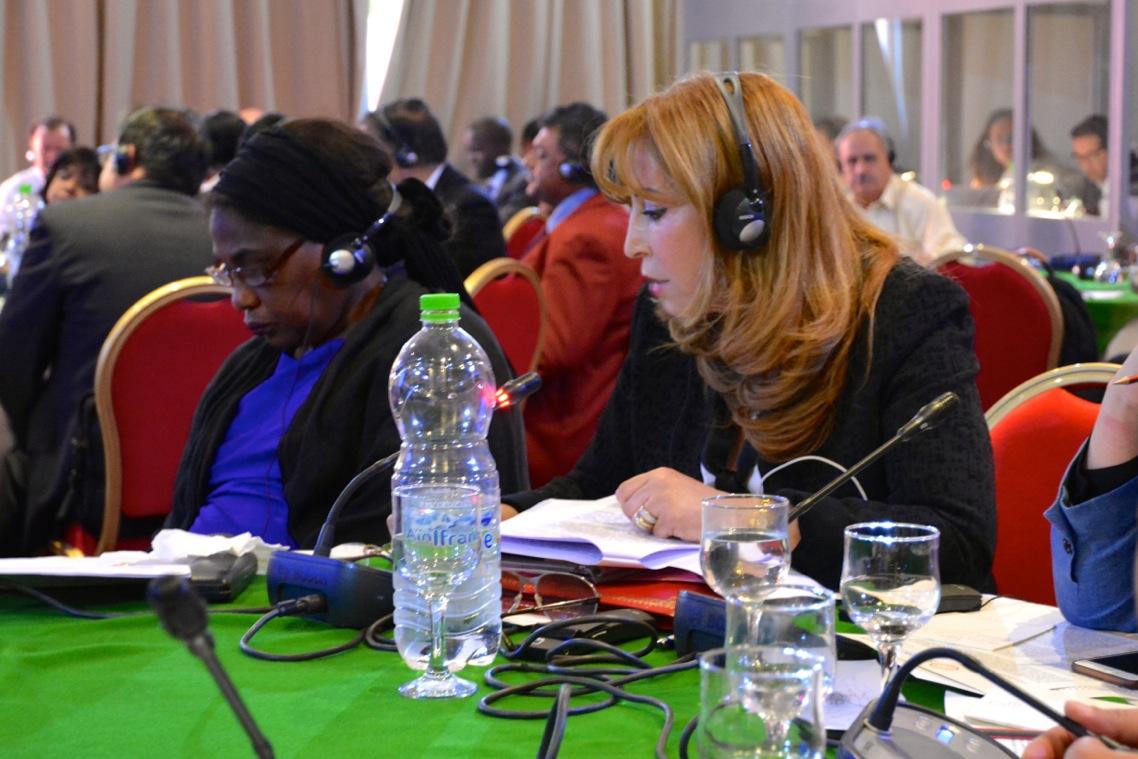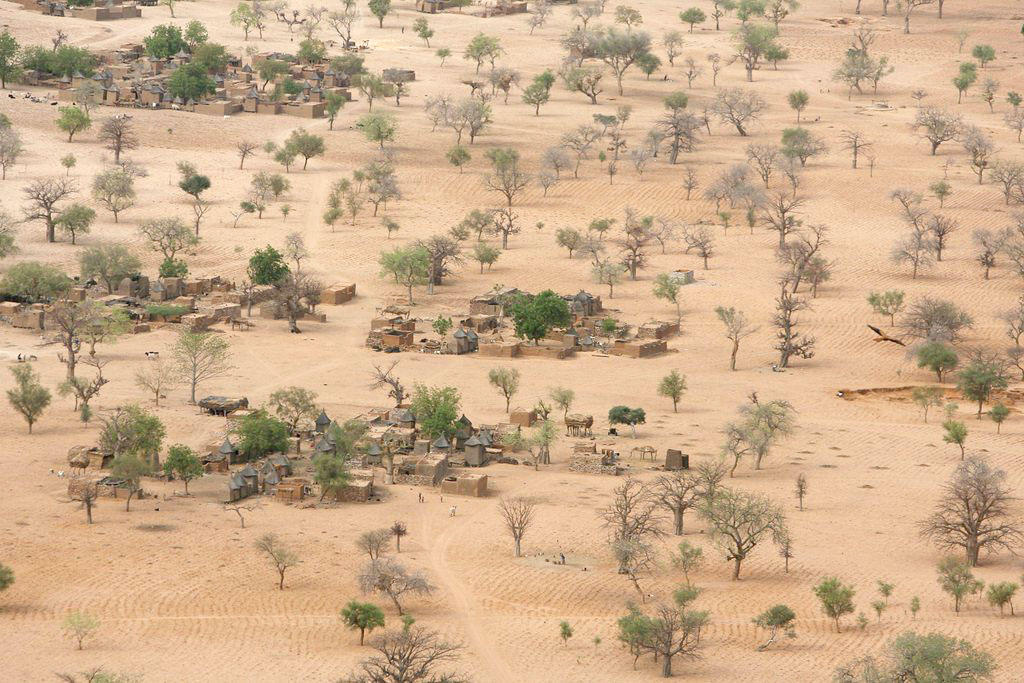The MPs fighting to keep climate on political agendas

Not far from the official climate talks in Marrakech, a Swiss-backed coalition of 20 parliaments is discussing how to translate policy into concrete law in their home countries.
“Members of parliament have a key role to play in that they pass the laws, they approve the budgets and they represent their people in their government systems,” Nicholas Dunlop, the secretary general of the Climate ParliamentExternal link, told swissinfo.ch at the gathering outside the Moroccan city.
Created in 2009, the Climate Parliament is a global network of lawmakers from around the world who share an interest in climate change and the transition from fossil fuels to renewable energy. Swiss aid of CHF5.6 million accounted for 10% of its 2013-2017 budget.
“We are not technicians specialised in climate change issues,” Salima Faraji, a deputy with Morocco’s Authenticity and Modernity Party, explained. “There are MPs who are pharmacists, doctors, lawyers, engineers. We have learned a lot about the effects of climate change. In my own region climate conditions have changed very much too.”

More
Marrakech: devil lies in detail for Swiss
Faraji is one of three Moroccan representatives in the Climate Parliament. Morocco, which doesn’t have oil or gas resources, has invested heavily in solar and wind energy. In fact, the country is home to the world’s biggest solar energy plant. Noor 1 was inaugurated earlier this year in Ouarzazate, at the edge of the Sahara desert. The $9 billion project is expected to provide electricity for 1.1 million people when it is completed in 2018.
The North African country announced plans to generate 42% of its energy from renewables by 2020, equally split between solar, wind and hydroelectric.
Faraji, a member parliamentary commission on justice, legislation and human rights, said the Climate Parliament has helped her in working on climate policy, motivationally and in keeping up-to-date on issues.
Swiss support
The group provides practical tools, such as information about renewable energy, including visits to foreign parliaments and technological sites employing or generating renewables.
Pio Wennubst, deputy director of the Swiss Global Cooperation Department, said the Climate Parliament allowed members to exchange experiences in an unpoliticised environment.
Activities have included a workshop for MPs from group members from MENA (Middle East North Africa) countries in Switzerland.
“It is important that they have this space to test possible systemic changes before they occur,” Wennubst said. “You can then either help accelerate the changes or realise that the direction being taken is not right. This is at least the hope that we have for supporting the Climate Parliament.”
The Swiss official said that beyond the role that MPs had to play on driving renewable energy legislation – through subsidies, for example – politicians needed to understand the incentive side of preparing the electorate to regulations that may otherwise be rejected.
Tunisia’s experience
“We have become a persuasive international force as a movement, when dealing with international talks, such as the COP22,” said Leila Ouled Ali, a MP from Tunisia, who has worked on translating her country’s international commitments on carbon emissions reduction by 30% into legislation.
The Climate Parliament allowed her “to see what we need to push to develop renewable energy, how to promote these sectors, and how to advocate influence on decision-making”.
Tunisia’s law on renewable energies, adopted in 2015, would have been impossible before the revolution, she said. “Before, there were personal and family interests, and important people in the country”, who would have obstructed such legislation from being formulated.
Dhamir Mannai, a former Tunisian MP who was central to the new legislation and the Climate Parliament’s coordinator for North Africa, said Switzerland played an active role in Tunisia by offering the support of a former MP and specialist on energy issues, Rudolf Rechsteiner.
“It was really special that the Swiss Development and Cooperation Agency was able to provide us with a former parliamentarian who had played a central role in Swiss law on renewable energy. At times Rechsteiner was actually sitting in Parliament in the corridors, whilst they were in committee amending the law, giving them technical information and advice.”
The Tunisian government is currently seeking $7 billion in new investment in renewable energy.
“That is probably one of the bigger impacts of Swiss development assistance in the past few years,” the Climate Parliament’s secretary general Dunlop commented.
Political effect
With the concern cast at the COP22 over the election of US Republican candidate Donald Trump and the future of the Paris 2015 agreement, Dunlop said the role of MPs is even more relevant. During his campaign, the New York billionaire referred to climate change as a Chinese hoax.
“Parallel tracks to international negotiations will become more important. The legislative strategy of MPs working together – regardless of who is in the White House – becomes even more critical.”
The parliamentary group is launching a so-called Green Grid Alliance, which would include up to 20 countries that would build renewable energy super-grids, new national smart grids as well as village grids to drive a rapid worldwide transition to clean energy. The plan will support the International Solar Alliance, an initiative launched by India at last year’s COP21.
But a number of the countries with members in the Climate Parliament are new democracies, such as Tunisia, or Morocco, where a new constitution was adopted in 2011, but where the king still appoints the prime minister from the largest political party.
When asked whether Climate Parliament members from new or evolving democracies could hold political clout for driving clean energy legislation, Mannai said that the choice of MPs was critical for progressive decision-making.
“In a country where even if the national assembly does not have much power, you may end up as a member of the Climate Parliament, because you were in government or were really committed, and that one person will make a big difference.”

In compliance with the JTI standards
More: SWI swissinfo.ch certified by the Journalism Trust Initiative

You can find an overview of ongoing debates with our journalists here. Please join us!
If you want to start a conversation about a topic raised in this article or want to report factual errors, email us at english@swissinfo.ch.